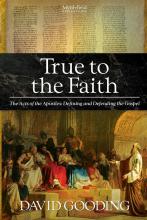
I have long found David Gooding's book, True to the Faith (paid link), a really helpful look at the book of Acts, mapping out how Luke's story unfolds and how it teaches us in the process.
As I look at chapters 19-28, he introduces his section on this with the following really helpful paragraph (page 338 in my 1990 edition; I'm not sure how much material has been added by the currently in-print 2013 edition to move the page numbers on):
“Wearisome though they must have been, and frustrating though the intervening months and years of waiting in prison or under house-arrest must sometimes have seemed, it gave Paul many opportunities to do what he had not been required to do in quite the same way before. Hitherto he had straightforwardly preached, lectured and discussed the gospel; now he was obliged to defend it.
“It needs no lengthy argument to prove Luke’s wisdom in filling the remainder of his book with an account of Paul's defence. If he had chosen, Luke could doubtless have included many more examples of Paul’s sermons and have told of the journeys he made, and of the churches he planted, after he was eventually released from prison .But a few more samples of his sermons would have added little to our understanding of the gospel he preached, since those sermons would not have differed in any substantial way from those whose summaries we have already been given. Nor would a description of his further journeys and church-plantings have given us significantly more information on the kind of work he did, only more about its extent.
“On the other hand, we cannot read Luke’s last section without realising that in the comparatively few years that Paul had been preaching the gospel and founding Christian churches throughout Asia Minor and Europe serious misunderstandings and misrepresentations, both of his gospel and of his behaviour, had been gaining widespread circulation. If these misunderstandings and misrepresentations had been allowed to take root and spread unchecked, without being publicly rebuffed and refuted, and that at the highest level, there would soon have been many places where sensible and knowledgeable people would no longer have been inclined to give the gospel so much of a hearing, let alone believe it. And what is more, many Christians themselves, especially in places like Jerusalem, confused by the prevailing but false rumours about what Paul stood for, might well have come to the conclusion that he was a dangerous maverick, if not a positive heretic. It was urgent, therefore, that Paul should take time off from his pioneer evangelism, and instead of simply preaching the gospel, defend it at the highest levels in both Jerusalem in the east and Rome in the west.”
Recent comments